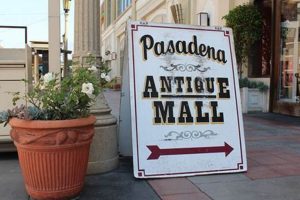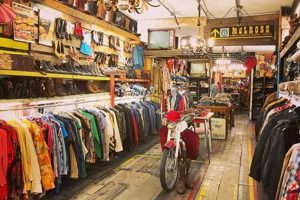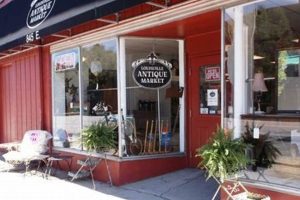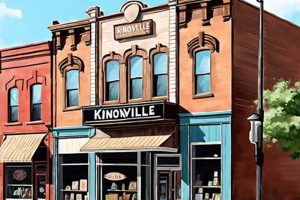Establishments in the Phoenix metropolitan area specializing in the resale of apparel, accessories, and home goods from previous eras constitute a distinct sector of the retail market. These businesses offer consumers the opportunity to acquire unique, pre-owned items, often characterized by their quality of construction, design aesthetics reflective of past trends, and potential historical significance.
The presence of such businesses provides several economic and cultural benefits. They contribute to a circular economy by extending the lifecycle of existing products, thereby reducing waste and promoting sustainable consumption practices. Furthermore, they preserve and showcase fashion and design history, allowing individuals to connect with past styles and trends. The availability of these goods enriches the retail landscape, offering alternatives to mass-produced items and fostering individuality in personal expression.
This article will delve into key aspects of this retail category, encompassing an overview of prominent locations, considerations for evaluating merchandise quality and authenticity, and the impact of these enterprises on the local community and environment.
Engaging with Phoenix establishments specializing in pre-owned goods requires a strategic approach. Prudent consumers can maximize their experience by adhering to specific guidelines.
Tip 1: Research Targeted Locations: Prior to visiting, conduct preliminary research on establishments in the Phoenix area. Identify stores specializing in specific eras or item categories that align with individual preferences. Online reviews and store websites provide valuable insights.
Tip 2: Inspect Merchandise for Imperfections: Thoroughly examine potential purchases for any signs of wear, damage, or alteration. Pay close attention to seams, closures, and linings in apparel. Scrutinize furniture for structural integrity and cosmetic flaws.
Tip 3: Assess Authenticity and Provenance: For items purported to be of significant age or rarity, attempt to verify their authenticity. Seek out details such as original labels, hallmarks, or manufacturing details. Consult with knowledgeable staff or independent appraisers when necessary.
Tip 4: Negotiate Prices Strategically: Price negotiation is often possible, particularly on items exhibiting imperfections or those that have remained in inventory for extended periods. Justify proposed offers based on the condition of the merchandise and prevailing market rates.
Tip 5: Consider Alterations and Restoration: Evaluate the potential for alterations or restoration to improve the fit or appearance of items. Factor in the cost of these services when determining the overall value of the prospective purchase. Reputable tailors and restoration specialists can enhance the longevity and appeal of pre-owned goods.
Tip 6: Review Return Policies: Before finalizing any purchase, carefully review the establishment’s return policy. Understand the conditions under which returns or exchanges are permitted, as policies can vary substantially. Document all transactions and retain receipts for future reference.
Adhering to these guidelines ensures a more informed and rewarding experience when engaging with establishments specializing in pre-owned merchandise in Phoenix. Prudent evaluation and strategic decision-making are paramount.
The subsequent section will explore the impact of these business on the broader Phoenix community.
1. Location Accessibility
The accessibility of a given location significantly impacts the success and viability of establishments specializing in vintage goods within the Phoenix metropolitan area. Readily accessible storefronts, characterized by ample parking, proximity to public transportation, and ease of navigation, demonstrably experience higher foot traffic and increased sales volume than those situated in less convenient locations. This direct correlation stems from the nature of vintage retail; prospective customers often engage in spontaneous browsing, influenced by visual cues and proximity to their existing routes.
Consider, for example, the clustering of several such businesses along specific corridors within the Melrose District. This area benefits from high visibility, pedestrian-friendly infrastructure, and established public transportation options. Consequently, businesses located here are demonstrably more successful than comparable establishments situated in more isolated areas of the city. Conversely, businesses located in areas with limited parking or difficult access often struggle to attract consistent clientele, even if they offer comparable or superior merchandise. Real-world examples show higher rental costs accepted within districts with preferable locations to establish the best outcome.
In conclusion, location accessibility is a critical determinant of success for vintage retail in Phoenix. Challenges associated with poor location can be mitigated through targeted marketing or online presence, but the fundamental advantage of a convenient, accessible location remains paramount. Understanding this relationship enables prospective business owners to make informed decisions and maximize their potential for success in a competitive market. Zoning restrictions, city planning and gentrification are the biggest challenges for vintage businesses to overcome to create a better business.
2. Inventory Curation
Inventory curation within Phoenix-based establishments specializing in vintage goods is a fundamental driver of both customer appeal and economic viability. The selection and presentation of merchandise directly dictates the store’s identity, attracting specific demographics and shaping perceptions of value. A carefully curated inventory demonstrates a deliberate and thoughtful approach to retail, distinguishing the establishment from generic resale outlets and fostering customer loyalty. For instance, a store specializing in mid-century modern furniture would meticulously source pieces from that era, ensuring authenticity and condition, while also arranging them in aesthetically pleasing displays that evoke the period. This contrasts sharply with a generalized thrift store that offers a more haphazard assortment.
The impact of inventory curation extends beyond aesthetics. It directly affects pricing strategies, marketing efforts, and overall brand positioning. An establishment known for its curated selection of high-end vintage designer clothing can command premium prices and attract a clientele willing to invest in unique, quality items. Conversely, a store with a more budget-friendly inventory must cater to a different customer base and adjust its marketing accordingly. The inventory also informs the store’s specialization, attracting certain demographics and creating more niche-based revenue. For example, a vintage store with an ecclectic inventory in the Roosevelt Row district could attract hipsters, and local artists for the revenue. A more niche inventory could attract very specific collectors, creating the most possible revenue.
Ultimately, effective inventory curation is not merely about acquiring vintage items; it is about crafting a cohesive narrative and establishing a distinct identity within the competitive Phoenix retail landscape. The challenges include identifying reliable sourcing channels, accurately assessing the value and condition of merchandise, and adapting to shifting consumer tastes. Overcoming these challenges requires a deep understanding of vintage trends, a keen eye for detail, and a commitment to providing customers with a curated shopping experience that transcends the mere act of buying and selling.
3. Clientele Diversity
The vitality of establishments specializing in pre-owned merchandise in Phoenix is inextricably linked to the diversity of their customer base. A heterogeneous clientele mitigates market volatility, ensuring a more stable revenue stream than reliance on a narrow demographic. This phenomenon stems from varying consumer preferences, purchasing power, and shopping habits. A store catering exclusively to a single age group or socioeconomic class is inherently more vulnerable to economic downturns or shifts in fashion trends. Clientele diversity is important for vintage stores phoenix.
Consider, for instance, a business that draws customers from diverse age groups, income levels, and cultural backgrounds. Younger patrons might seek out affordable vintage clothing for self-expression, while older individuals may be interested in acquiring rare collectibles or antique furniture. High-income consumers might pursue designer pieces or investment-grade items, while budget-conscious shoppers focus on discounted or repurposed goods. The vintage district located in Downtown Phoenix benefits from tourists seeking novelty items, and locals who need unique pieces for their wardrobe. Businesses that actively cultivate a broad customer base, through targeted marketing or inclusive product offerings, are better positioned to weather economic fluctuations and adapt to changing consumer demands.
In summary, clientele diversity is a critical component of the long-term sustainability and profitability of vintage retail in Phoenix. While challenges may arise in catering to such a varied customer base, the benefits of reduced risk and increased market resilience far outweigh the costs. Understanding and actively fostering clientele diversity is therefore an essential strategy for success in this sector.
4. Preservation Efforts
Preservation efforts are integral to the function and viability of establishments specializing in pre-owned goods in Phoenix. These endeavors extend beyond mere maintenance; they encompass the active safeguarding of tangible cultural heritage and the extension of product lifecycles. Without dedicated attention to preservation, the value proposition of such businesses diminishes, as the appeal of vintage merchandise is intrinsically linked to its condition and authenticity. For example, a vintage clothing store might employ specialized cleaning techniques to remove stains and odors from delicate fabrics, or a furniture restorer might meticulously repair damaged components of antique chairs, preventing further deterioration and enhancing their aesthetic value. Vintage stores phoenix rely heavily on these efforts to remain profitable and useful for their clients.
The scope of preservation activities is diverse, encompassing cleaning, repair, restoration, and appropriate storage. Clothing may undergo dry cleaning or delicate hand-washing to remove dirt and odors. Furniture restoration often involves repairing structural damage, refinishing surfaces, and replacing worn upholstery. Books and paper ephemera require careful handling and storage in controlled environments to prevent degradation from light, humidity, and pests. Effective preservation not only maintains the existing condition of merchandise but also mitigates future damage, thereby increasing its longevity and resale value. Neglecting preservation efforts leads to accelerated deterioration, diminished marketability, and the ultimate loss of valuable historical artifacts. The tangible, and intangible elements of the pieces are often intertwined, and stores that don’t preserve them will suffer the consequences.
In conclusion, preservation efforts are not merely a supplementary activity but a core function of establishments dealing in pre-owned goods in Phoenix. A commitment to responsible preservation practices enhances the value proposition of these businesses, safeguards cultural heritage, and promotes sustainable consumption patterns. The challenges associated with preservation including the cost of specialized equipment and skilled labor are outweighed by the long-term benefits of enhanced product value and increased customer loyalty. Therefore, these measures are vital to the success and sustainability of vintage stores phoenix.
5. Community Engagement
Community engagement represents a critical facet of operations for establishments specializing in vintage goods within the Phoenix metropolitan area. The degree to which these businesses actively participate in and contribute to the local community often determines their long-term viability and cultural significance. Active engagement fosters loyalty and enhances the overall perception of the establishment, positioning it as more than a mere retail outlet.
- Local Partnerships and Collaborations
Phoenix vintage retailers often engage in partnerships with local artists, designers, and other businesses. These collaborations can take the form of joint marketing campaigns, shared event spaces, or the showcasing of local artwork within the store. Such partnerships expand the store’s reach, introduce it to new customer segments, and contribute to the local creative ecosystem. For example, a vintage clothing store might collaborate with a local jewelry designer to host a trunk show featuring both vintage apparel and handcrafted jewelry.
- Event Hosting and Participation
Hosting or participating in community events is another common form of engagement. Vintage stores may organize fashion shows featuring vintage clothing, host workshops on topics such as clothing repair or upcycling, or participate in local festivals and markets. These events provide opportunities to interact directly with potential customers, build brand awareness, and demonstrate the store’s commitment to the community. A vintage furniture store, for instance, might host a workshop on furniture restoration techniques.
- Charitable Contributions and Support
Many vintage businesses in Phoenix support local charities and non-profit organizations through donations or fundraising events. They may donate a portion of their sales to a particular cause or host a benefit auction featuring vintage items. Such charitable activities demonstrate a sense of social responsibility and resonate positively with customers who value businesses that give back to the community. For instance, a vintage bookstore may donate a percentage of its proceeds to a local literacy program.
- Preservation of Local History
Vintage stores, by their very nature, contribute to the preservation of local history and cultural heritage. They provide a tangible link to the past, offering customers the opportunity to acquire and appreciate items that reflect previous eras. Some stores may actively promote local history through displays, educational materials, or collaborations with local historical societies. A vintage record store, for example, might curate a collection of recordings by Phoenix-based musicians and provide information about the local music scene.
These diverse forms of community engagement demonstrate the vital role that establishments specializing in vintage goods can play in shaping the cultural landscape of Phoenix. By actively participating in and contributing to the local community, these businesses enhance their brand image, foster customer loyalty, and contribute to the preservation of local history and culture, solidifying vintage stores phoenix as a valuable addition to the region.
Frequently Asked Questions
The following section addresses common inquiries regarding establishments specializing in pre-owned goods within the Phoenix metropolitan area. It is intended to provide clarity on relevant aspects of this retail sector.
Question 1: What defines an establishment as a “vintage store” in Phoenix?
A business is typically classified as a “vintage store” if its primary focus is the resale of apparel, accessories, home goods, or other items that are at least 20-30 years old. The merchandise often reflects specific design aesthetics or historical periods. Note that some stores may specialize in items from particular eras, while others offer a broader selection.
Question 2: How can one assess the authenticity of vintage items in Phoenix stores?
Authenticity verification requires careful inspection. Look for original labels, hallmarks, or manufacturing details. Research the item’s provenance and compare it to known characteristics of similar items from the purported period. Consulting with knowledgeable staff or independent appraisers can be beneficial, particularly for high-value or rare items.
Question 3: What are the typical price ranges for vintage merchandise in Phoenix?
Price ranges vary significantly, depending on the item’s age, condition, rarity, designer, and overall desirability. Apparel and accessories can range from a few dollars for everyday items to hundreds or thousands for designer pieces. Furniture and collectibles may also exhibit a wide range of prices.
Question 4: What factors should be considered when evaluating the condition of vintage items?
Condition assessment involves careful scrutiny for wear, damage, or alterations. Examine seams, closures, and linings in apparel; assess furniture for structural integrity and cosmetic flaws; and inspect books and paper ephemera for tears, stains, or fading. Factor in the potential cost of repairs or restoration when determining the item’s overall value.
Question 5: Are there specific neighborhoods in Phoenix known for their concentration of vintage stores?
Several areas in Phoenix are known for their higher concentration of businesses specializing in pre-owned goods. The Melrose District, Grand Avenue, and sections of downtown Phoenix are notable examples. Researching specific locations prior to visiting is recommended.
Question 6: What are the benefits of shopping at vintage stores in Phoenix beyond acquiring unique items?
Beyond the acquisition of unique merchandise, shopping at these establishments contributes to a circular economy, reduces waste, and supports sustainable consumption practices. It also allows individuals to connect with fashion and design history and promotes individuality in personal expression. Additionally, it supports local businesses and contributes to the economic vitality of the community.
In summary, engaging with establishments specializing in pre-owned goods in Phoenix offers diverse opportunities and considerations. Thorough evaluation, informed decision-making, and an understanding of the market are paramount.
The subsequent section will explore the future trends and outlook for this retail sector in the Phoenix metropolitan area.
vintage stores phoenix
This exploration has illuminated the multifaceted nature of establishments specializing in the resale of pre-owned goods within the Phoenix metropolitan area. Key aspects, including location accessibility, inventory curation, clientele diversity, preservation efforts, and community engagement, have been identified as critical determinants of success and sustainability. These elements collectively shape the identity and value proposition of each business, influencing customer perception and long-term viability.
The ongoing evolution of consumer preferences, economic conditions, and technological advancements will undoubtedly shape the future of vintage retail in Phoenix. Continued adaptation, innovation, and a commitment to responsible business practices will be essential for establishments seeking to thrive in this dynamic market. The preservation of tangible cultural heritage and the promotion of sustainable consumption patterns remain compelling justifications for supporting this sector. Further research and community investment are warranted to ensure its continued growth and relevance.







